Achieving Personalized Precision Education Using the Catboost Model during the COVID-19 Lockdown Period in Pakistan
Abstract
:1. Introduction
2. Literature Review
3. Proposed Model for Precision Education
3.1. Materials and Methods
3.1.1. Data Acquisition
3.1.2. Data Resampling
3.1.3. Data Pre-Processing
3.1.4. Feature Selection and Extraction
3.1.5. Supervised Machine Learning
3.1.6. Catboost Algorithm Architecture
| Algorithm 1: Proposed Catboost algorithm for performance analysis |
Input: {(ax,bx)}mx=1, i, α, l, t, switch
|
3.1.7. Model Validation
4. Experiment and Results
Dataset
5. Conclusions and Future Recommendations
- To improve the model’s generalizability and consider more attributes for precision teaching in higher education, it is important to think about larger student datasets;
- The performance of the model and the accuracy can be enhanced by training the Catboost classifier on a large dataset;
- The scope of this work can be extended to include the utilization of hybrid models by combining deep learning and machine learning strategies;
- Academic disciplines other than information technology and management sciences can be considered to generate complexity and diverse student feedback;
- This work could be expanded to predict the performance of students from developed countries and developing countries during COVID-19 in order to develop a meaningful comparison between the two groups of students;
- Future development should emphasize both synchronous and asynchronous classes in different academic disciplines.
Author Contributions
Funding
Institutional Review Board Statement
Informed Consent Statement
Data Availability Statement
Acknowledgments
Conflicts of Interest
References
- Yang, S.J.H. Precision education: New challenges for AI in education [conference keynote]. In Proceedings of the 27th International Conference on Computers in Education (ICCE), Kenting, Taiwan, 2–6 December 2019; Asia-Pacific Society for Computers in Education APSCE: Kenting, Taiwan, 2019; pp. 105–108. [Google Scholar]
- Hart, S.A. Precision education initiative: Moving toward personalized education. Mind Brain Educ. 2016, 10, 209–211. [Google Scholar] [CrossRef]
- Cook, C.R.; Kilgus, S.P.; Burns, M.K. Advancing the science and practice of precision education to enhance student outcomes. J. Sch. Psychol. 2018, 66, 4–10. [Google Scholar] [CrossRef]
- Maldonado-Mahauad, J.; Pérez-Sanagustín, M.; Kizilcec, R.F.; Morales, N.; Munoz-Gama, J. Mining theory-based patterns from big data: Identifying self-regulated learning strategies in Massive Open Online Courses. Comput. Hum. Behav. 2018, 80, 179–196. [Google Scholar] [CrossRef]
- Wilson, M.S.; Ismaili, P.B. Toward maximizing the student experience and value proposition through precision education. Bus. Educ. Innov. J. 2019, 11, 119–124. [Google Scholar]
- Agarwal, R.; Dhar, V. Big data, data science, and analytics: The opportunity and challenge for IS research. Inf. Syst. Res. 2014, 25, 443–448. [Google Scholar] [CrossRef]
- Hwang, G.-J.; Spikol, D.; Li, K.-C. Guest editorial: Trends and research issues of learning analytics and educational big data. Educ. Technol. Soc. 2018, 21, 134–136. [Google Scholar]
- Tempelaar, D.; Rienties, B.; Nguyen, Q.; Tempelaar, D.; Rienties, B.; Nguyen, Q. The contribution of dispositional learning analytics to precision education. Educ. Technol. Soc. 2021, 24, 109–122. [Google Scholar]
- Wu, J.Y.; Yang CC, Y.; Liao, C.H.; Nian, M.W. Analytics 2.0 for Precision Education: An Integrative Theoretical Framework of the Human and Machine Symbiotic Learning. Educ. Technol. Soc. 2021, 24, 267–279. [Google Scholar]
- Dias, S.B.; Hadjileontiadou, S.J.; Diniz, J.; Hadjileontiadis, L.J. DeepLMS: A deep learning predictive model for supporting online learning in the COVID-19 era. Sci. Rep. 2020, 10, 19888. [Google Scholar] [CrossRef]
- Andrei, P.C.; Stanculescu, M.; Andrei, H.; Caciula, I.; Diaconu, E.; Bizon, N.; Mazare, A.G.; Ionescu, L.M.; Gaiceanu, M. Comparative and Predictive Analysis of Electrical Consumption during Pre-and Pandemic Periods: Case Study for Romanian Universities. Sustainability 2022, 14, 11346. [Google Scholar] [CrossRef]
- Abdullah, N.A.; Shamsi, N.A.; Jenatabadi, H.S.; Ng, B.K.; Mentri, K.A.C. Factors affecting undergraduates’ academic performance during COVID-19: Fear, stress and teacher-parents’ support. Sustainability 2022, 14, 7694. [Google Scholar] [CrossRef]
- Dascalu, M.D.; Ruseti, S.; Dascalu, M.; McNamara, D.S.; Carabas, M.; Rebedea, T.; Trausan-Matu, S. Before and during COVID-19: A Cohesion Network Analysis of students’ online participation in moodle courses. Comput. Hum. Behav. 2021, 121, 106780. [Google Scholar] [CrossRef] [PubMed]
- Atlam, E.S.; Ewis, A.; El-Raouf MM, A.; Ghoneim, O.; Gad, I. A new approach in identifying the psychological impact of COVID-19 on university student’s academic performance. Alex. Eng. J. 2022, 61, 5223–5233. [Google Scholar] [CrossRef]
- Yang, C.C.Y.; Chen, I.Y.L.; Ogata, H. Toward Precision Education: Educational Data Mining and Learning Analytics for Identifying Students’ Learning Patterns with Ebook Systems. Educ. Technol. Soc. 2021, 24, 152–163. [Google Scholar]
- Lu, O.; Huang, A.; Huang, J.; Lin, A.; Ogata, H.; Yang, S. International Forum of Educational Technology & Society Applying Learning Analytics for the Early Prediction of Students’ Academic Performance in Blended Learning. J. Educ. Technol. Soc. 2018, 21, 220–232. [Google Scholar]
- Moreno-Marcos, P.M.; Pong, T.C.; Munoz-Merino, P.J.; Kloos, C.D. Analysis of the Factors Influencing Learners’ Performance Prediction with Learning Analytics. IEEE Access 2018, 8, 5264–5282. [Google Scholar] [CrossRef]
- Azcona, D.; Hsiao, I.H.; Smeaton, A.F. Detecting students-at-risk in computer programming classes with learning analytics from students’ digital footprints. User Model. User-Adapt. Interact. 2019, 29, 759–788. [Google Scholar] [CrossRef]
- Yasuura, H.; Kyung, C.M.; Liu, Y.; Lin, Y.L. Learning Analytics for E-Book-Based Educational Big Data in Higher Education. In Smart Sensors at the IoT Frontier; Springer: Berlin/Heidelberg, Germany, 2017; pp. 1–378. [Google Scholar] [CrossRef]
- Tsai, S.C.; Chen, C.H.; Shiao, Y.T.; Ciou, J.S.; Wu, T.N. Precision education with statistical learning and deep learning: A case study in Taiwan. Int. J. Educ. Technol. High. Educ. 2020, 17, 12. [Google Scholar] [CrossRef]
- Latheef, A.; Ali, M.F.L.; Bhardwaj, A.B.; Shukla, V.K. Structuring learning analytics through visual media and online classrooms on social cognition during COVID-19 pandemic. J. Phys. Conf. Ser. 2021, 1714, 012019. [Google Scholar] [CrossRef]
- Nkomo, L.M.; Nat, M. Student Engagement Patterns in a Blended Learning Environment: An Educational Data Mining Approach. TechTrends 2021, 65, 808–817. [Google Scholar] [CrossRef]
- Weng, J.-X.; Huang, A.Y.; Lu, O.H.; Chen, I.Y.; Yang, S.J. The implementation of precision education for learning analytics. In Proceedings of the 2020 IEEE International Conference on Teaching, Assessment, and Learning for Engineering, TALE, Takamatsu, Japan, 8–11 December 2020; pp. 327–332. [Google Scholar]
- Wu, J.-Y.; Hsiao, Y.-C.; Nian, M.-W. Using supervised machine learning on large-scale online forums to classify course-related Facebook messages in predicting learning achievement within the personal learning environment. Interact. Learn. Environ. 2020, 28, 65–80. [Google Scholar] [CrossRef]
- Zhu, X.; Goldberg, A.B. “Introduction to Semi-Supervised Learning,” Synthesis Lectures on Artificial Intelligence and Machine Learning; Morgan and Claypool Publishers: San Rafael, CA, USA, 2009; Volume 3, pp. 1–130. [Google Scholar]
- Soltaninejad, M.; Yang, G.; Lambrou, T.; Allinson, N.; Jones, T.L.; Barrick, T.R.; Howe, F.A.; Ye, X. Supervised learning based multimodal MRI brain tumour segmentation using texture features from supervoxels. Comput. Methods Programs Biomed. 2018, 157, 69–84. [Google Scholar] [CrossRef] [PubMed]
- Ramaswami, G.; Susnjak, T.; Mathrani, A. On Developing Generic Models for Predicting Student Outcomes in Educational Data Mining. Big Data Cogn. Comput. 2022, 6, 6. [Google Scholar] [CrossRef]
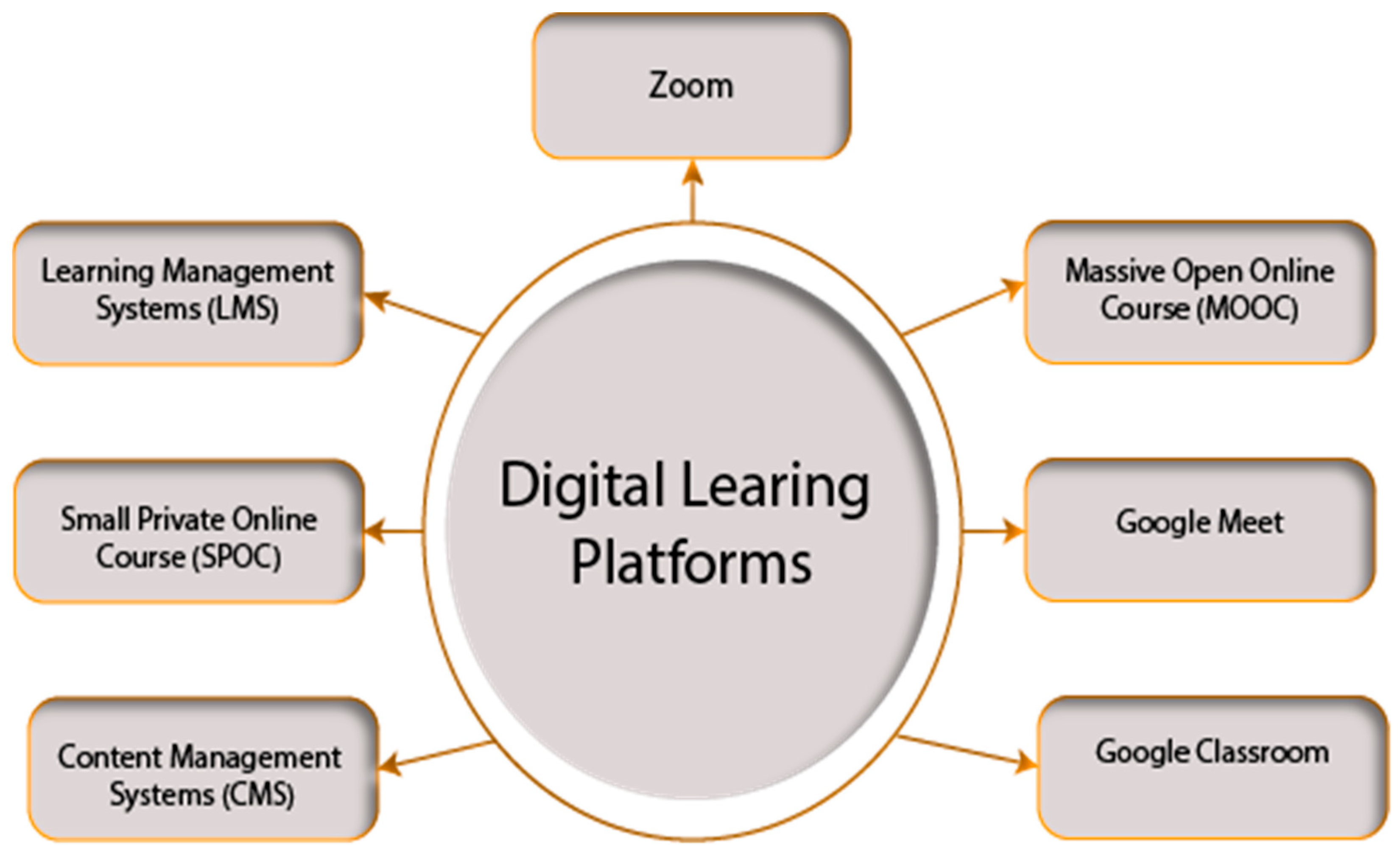
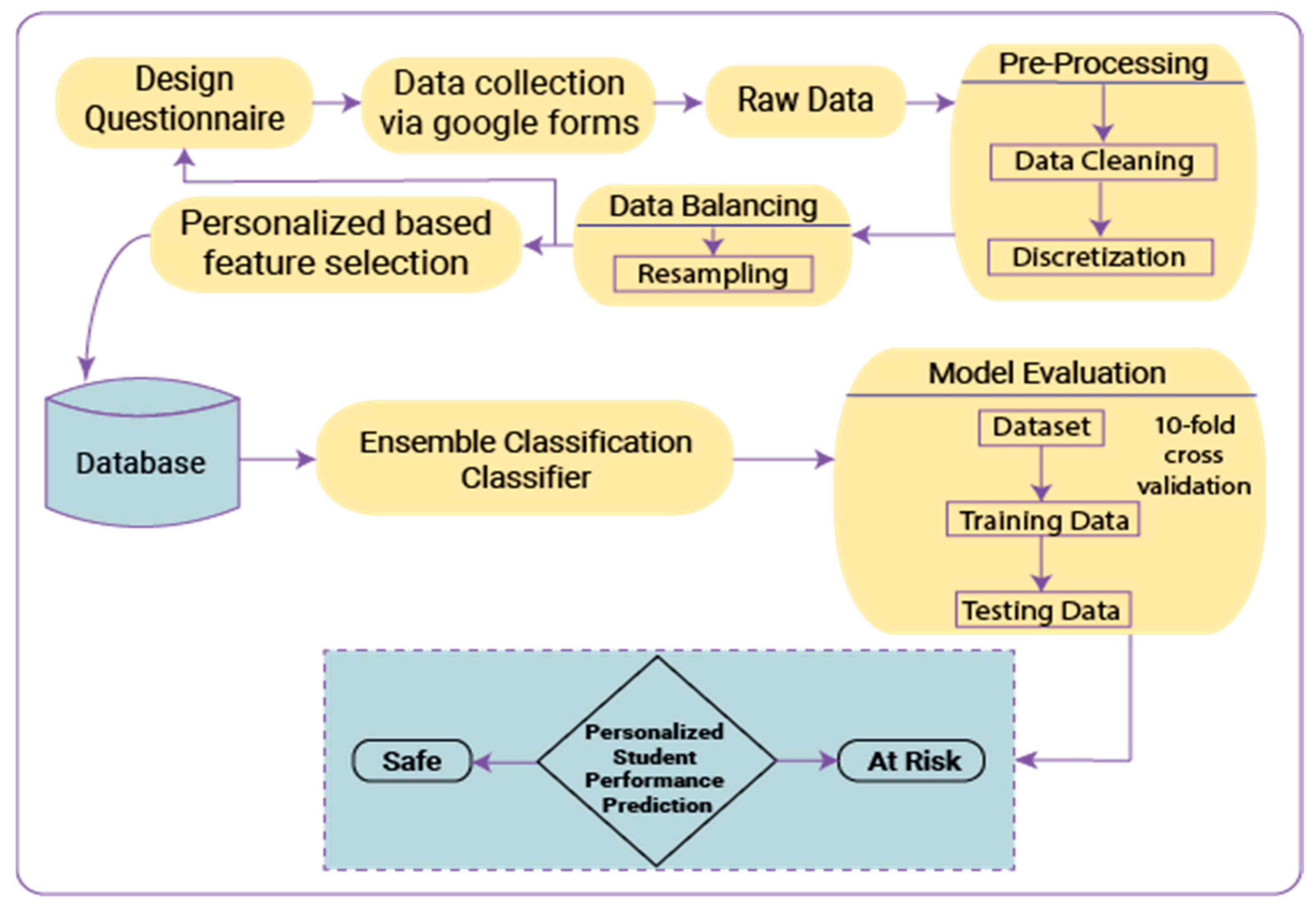

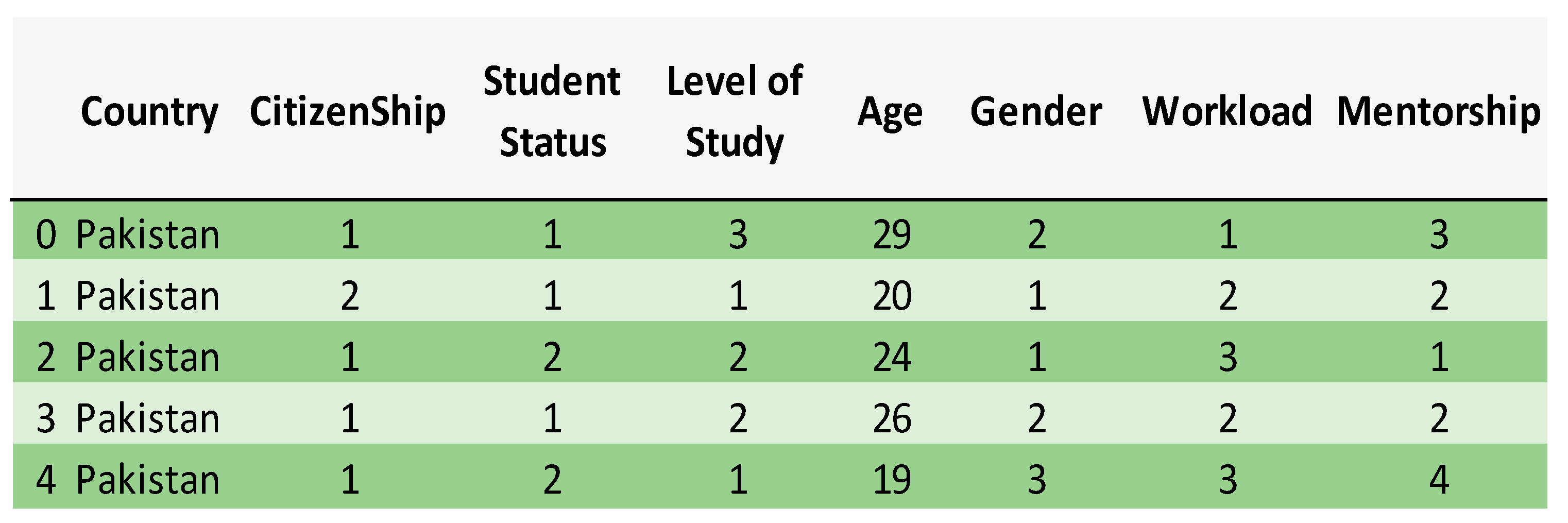
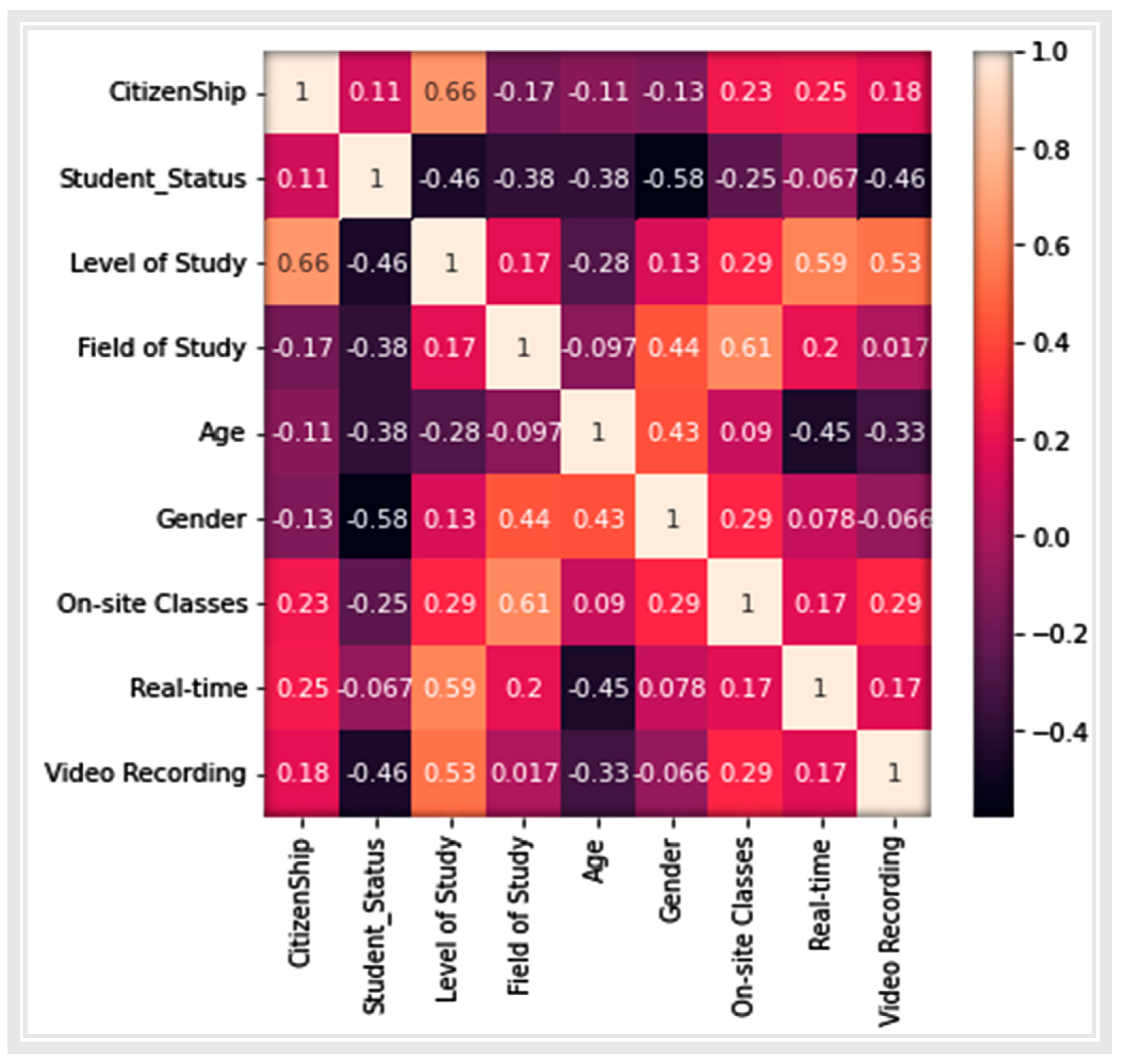
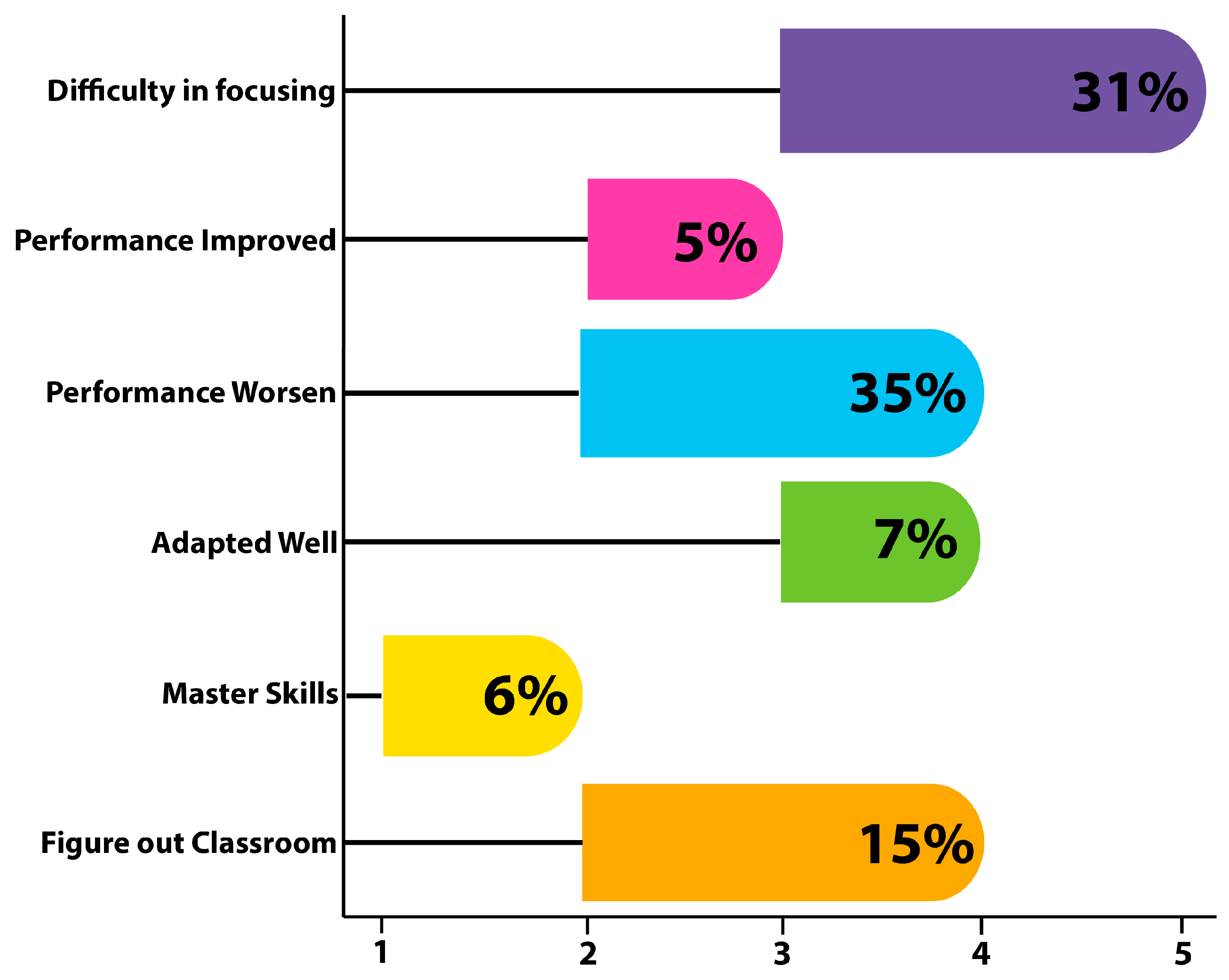
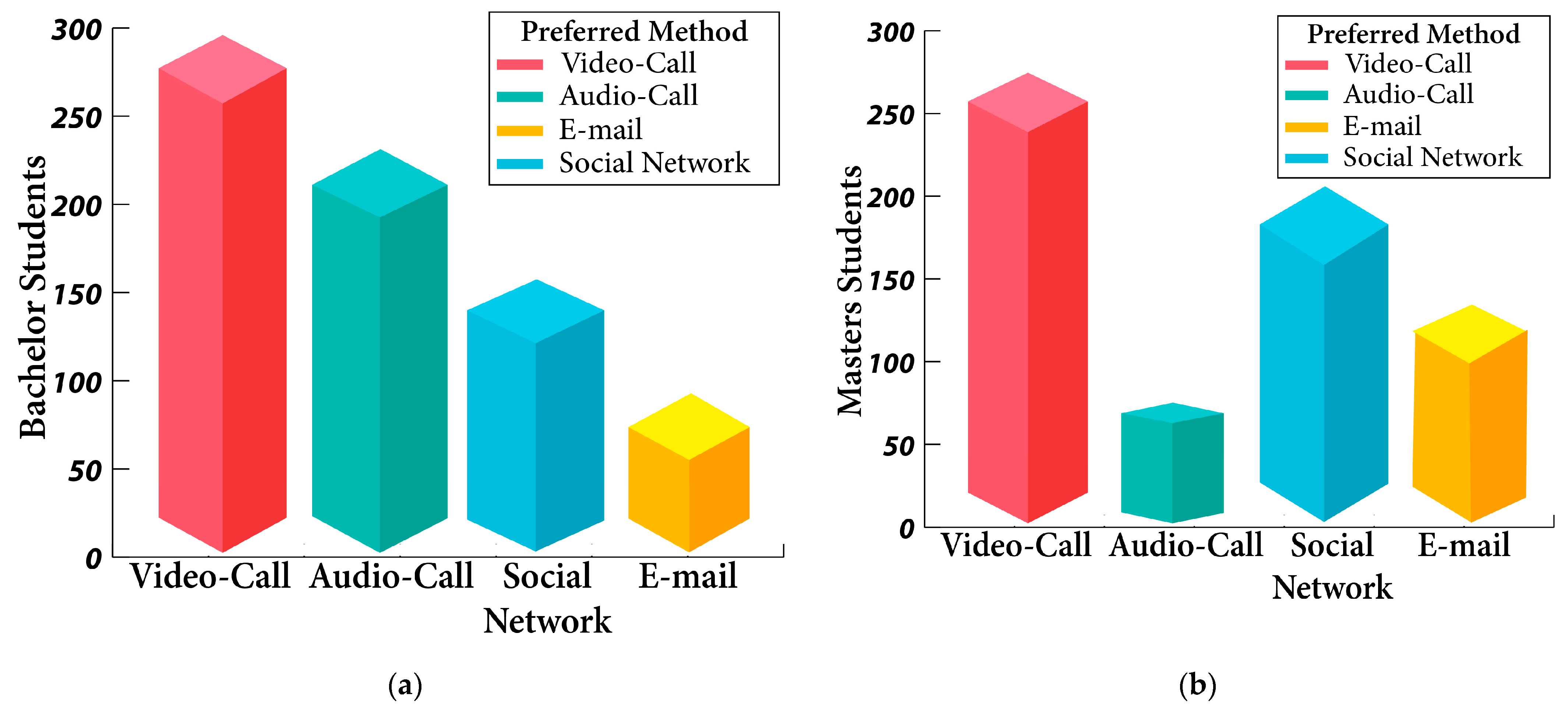
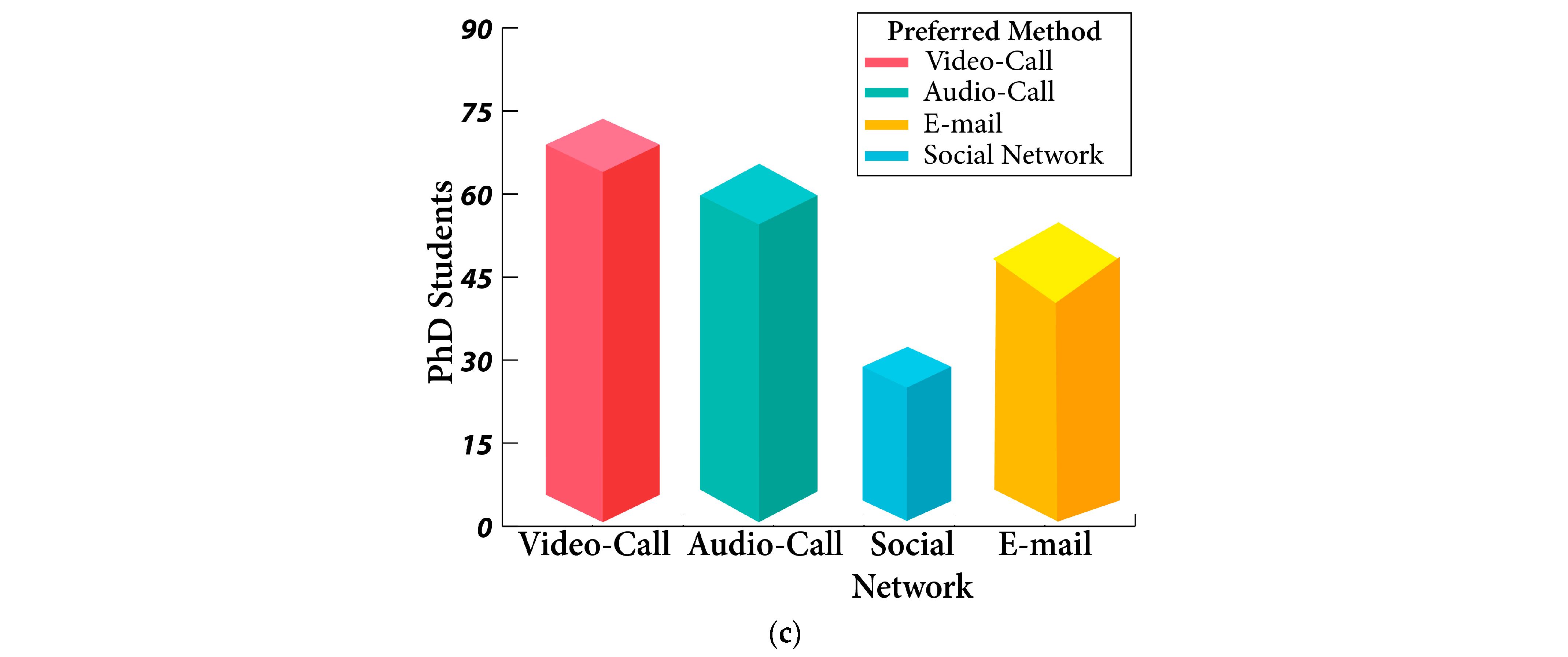
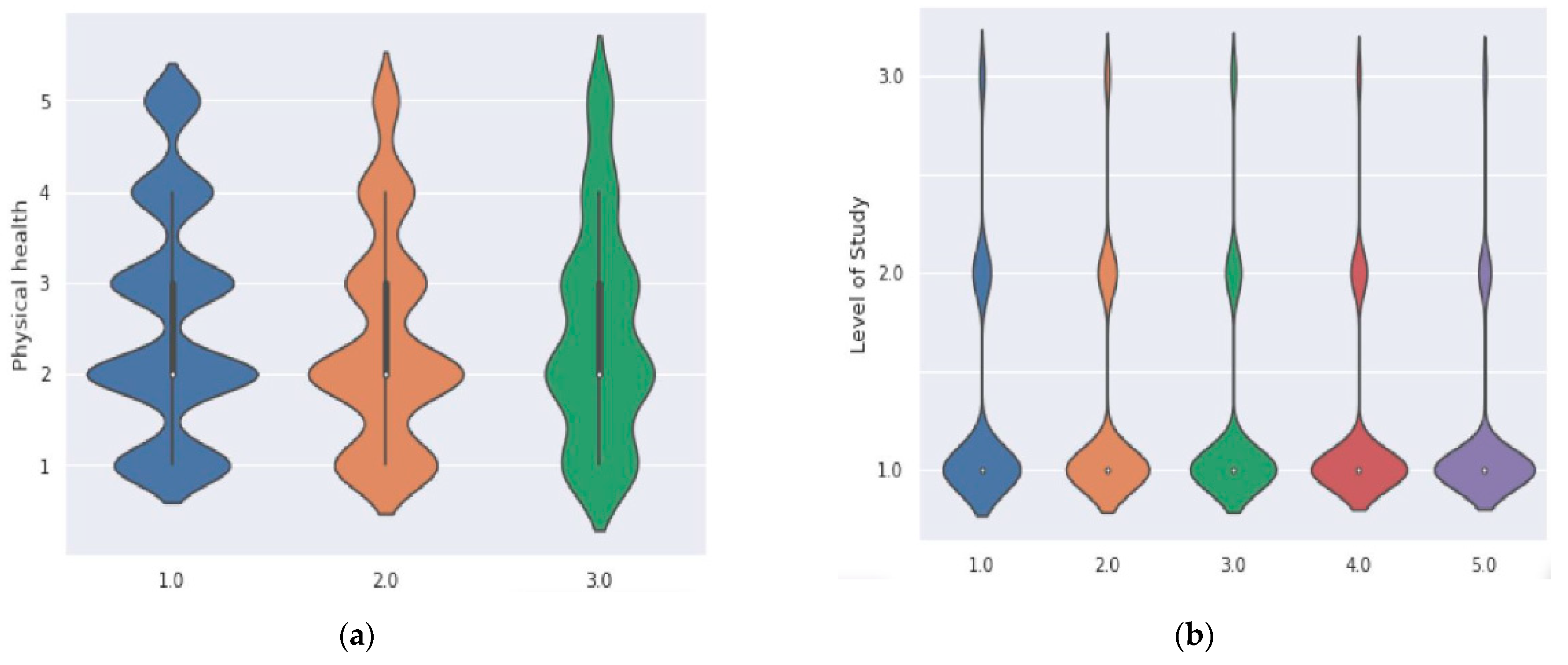
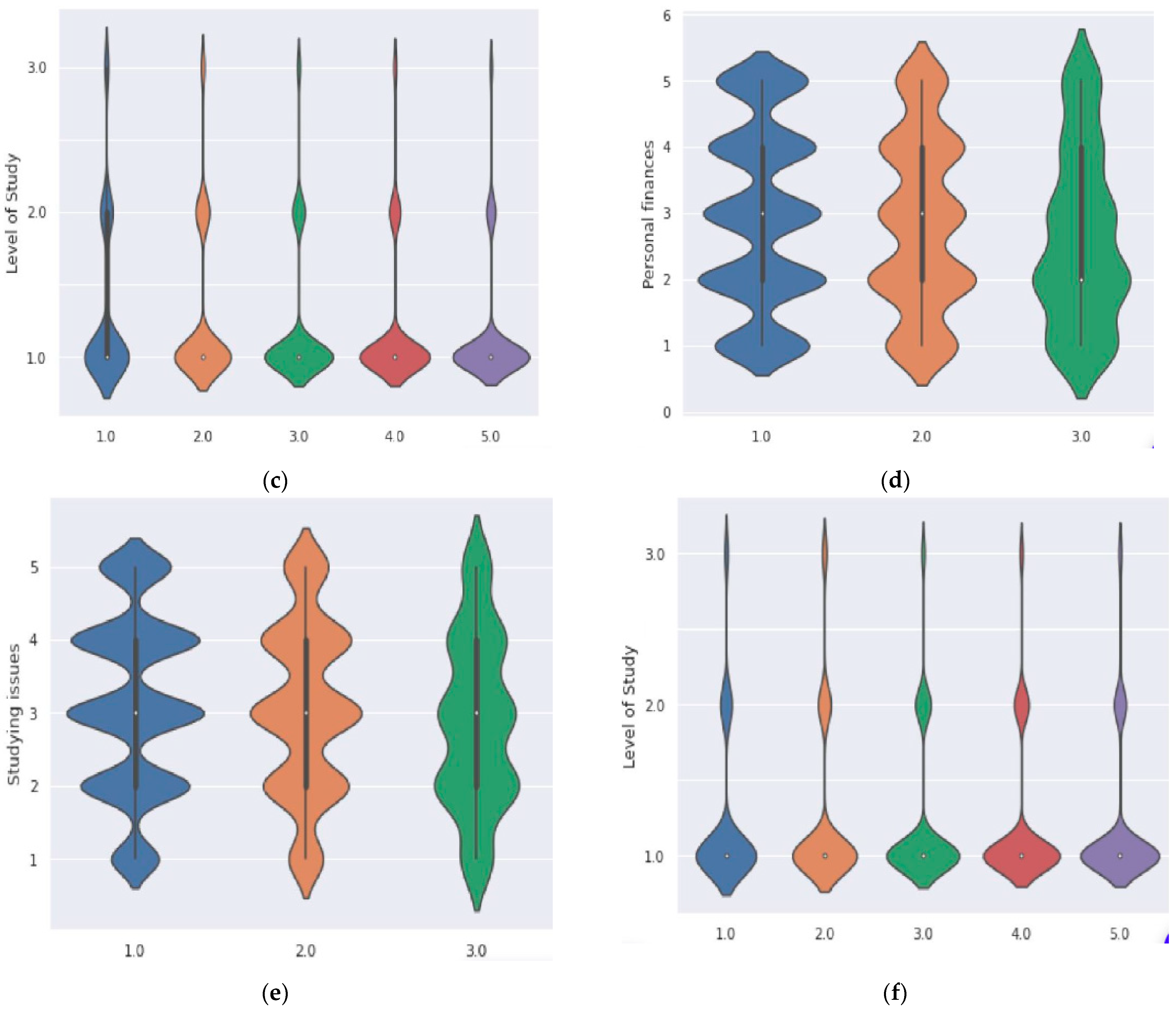
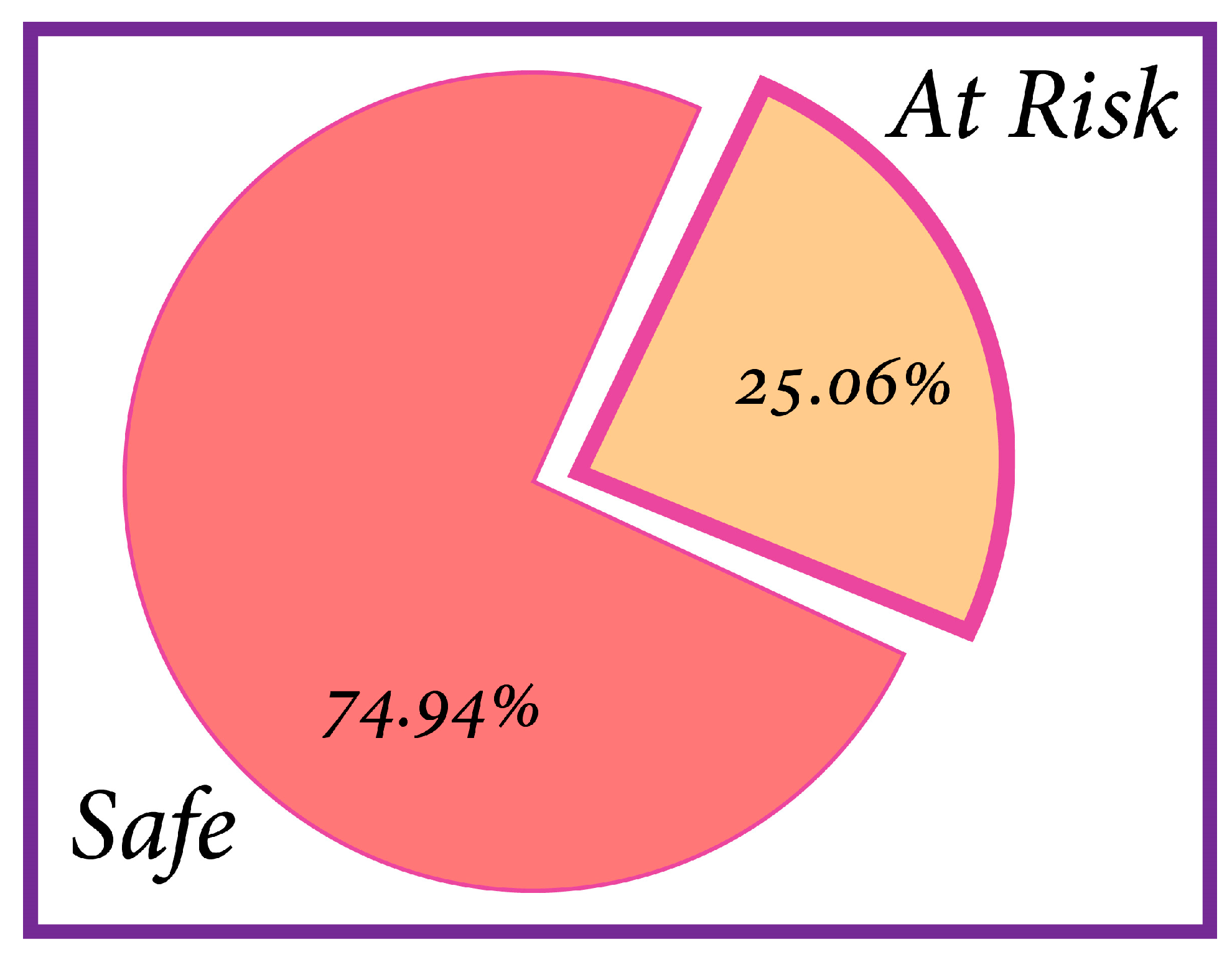





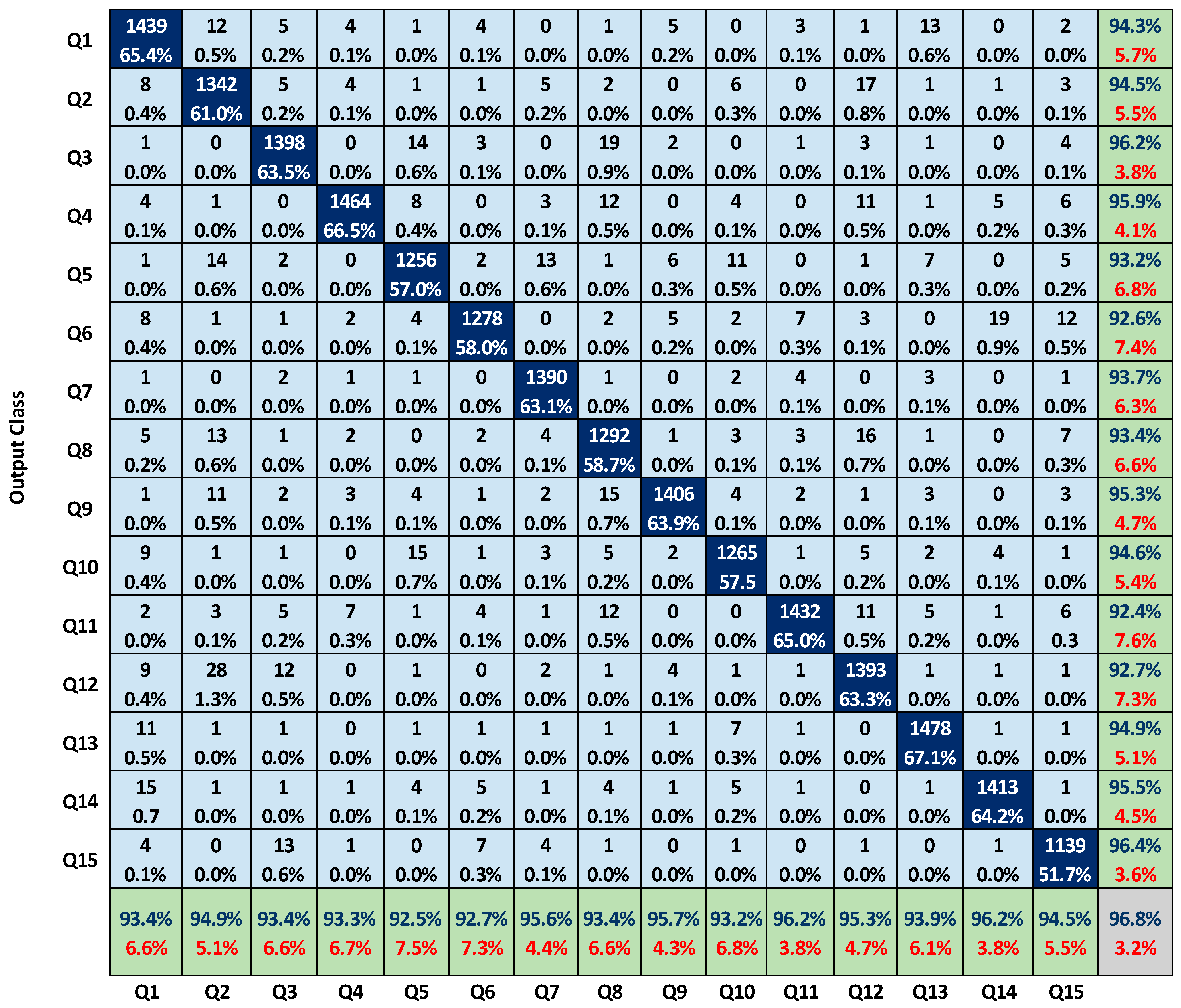
| Paper | Contribution | Technique | Results | Limitations |
|---|---|---|---|---|
| [15] | Student performance evaluation | SVM, ANN, Naïve Bayes, KNN, and DT | 94.75% accuracy | Smaller number of attributes |
| [16] | Final performance | Principle Component Regression (PCR) | 85% accuracy | Lack LA interventions |
| [18] | Predicted weak students | Data Mining classifiers | K-neighbors performed best | Speech and video sources not considered |
| [19] | Final scores | Discrete Graphs | Proposed model outperformed | Data integration and visualization were not tackled |
| [20] | Predicted dropout rate | Multilayer Perceptron | 77% accuracy | Less accuracy |
| [23] | Precision education | SVC, LR, XGB, and RF | 80% accuracy | Model not generic enough |
| [24] | Improved learner efficiency | SVM, RF, and ANN | 91% accuracy rate | Smaller dataset |
| Student_Status | Level of Study | Field of Study | Age | Gender |
|---|---|---|---|---|
| Full-time | Bachelor | Applied Sciences | 20 | Female |
| Full-time | Doctoral | Natural and Life Sciences | 34 | Male |
| Part-time | Bachelor | Arts and Humanities | 23 | Male |
| Full-time | Master | Applied Sciences | 24 | Female |
| Part-time | Master | Social Sciences | 28 | Male |
| Part-time | Bachelor | Natural and Life Sciences | 22 | Female |
| Part-time | Master | Social Sciences | 23 | Female |
| Part-time | Bachelor | Social Sciences | 19 | Male |
| Part-time | Bachelor | Applied Sciences | 23 | Female |
| Q. NO | Description |
|---|---|
| Q # 1 | Were you a full time or a part time student? |
| Q # 2 | Your enrolled level of study at that period (Bachelor’s, Master’s or Doctoral)? |
| Q # 3 | What was your main field of study (arts, social, applied or natural science)? |
| Q # 4 | Due to COVID-19, have your on-site classes been cancelled or not? |
| Q # 5 | Through which medium your online classes had been organized? |
| Q # 6 | Had your workload increased during the online classes? |
| Q # 7 | During COVID-19 which was your preferred method of mentorship? |
| Q # 8 | How much you were satisfied with the method of mentorship? |
| Q # 9 | Have you been provided with assignments and quizzes on regular basis? |
| Q # 10 | Have your mentor responded to your queries on time? |
| Q # 11 | Have you been satisfied with practical classes arranged during online session? |
| Q # 12 | Were you having access of proper tools and equipment’s needed for taking online classes during COVID-19 period? |
| Q # 13 | Have you faced studying issues regarding lectures, seminars and practical work? |
| Q # 14 | Have your professional career, mental or physical health affected during COVID-19 period? |
| Q # 15 | Having you faced difficulty while coordinating with your teacher openly, during online session? |
| Paper | Technique | Accuracy (%) | Error Rate (%) |
|---|---|---|---|
| [13] | ANN | 94.75 | 5.25 |
| [18] | Multilayer Perceptron | 77 | 23 |
| [21] | SVC | 80 | 20 |
| [25] | CatBoost | 75 | 25 |
| [26] | GA | 80 | 20 |
| [27] | LR | 83 | 17 |
| [Our work] | CatBoost | 96.8 | 3.2 |
| Class | Precision | Recall | F-Measure | ROC Area |
|---|---|---|---|---|
| Safe | 96.2% | 94.6% | 92.6% | 93.0% |
| At Risk | 97.4% | 96.1% | 96.6% | 95.2% |
Disclaimer/Publisher’s Note: The statements, opinions and data contained in all publications are solely those of the individual author(s) and contributor(s) and not of MDPI and/or the editor(s). MDPI and/or the editor(s) disclaim responsibility for any injury to people or property resulting from any ideas, methods, instructions or products referred to in the content. |
© 2023 by the authors. Licensee MDPI, Basel, Switzerland. This article is an open access article distributed under the terms and conditions of the Creative Commons Attribution (CC BY) license (https://creativecommons.org/licenses/by/4.0/).
Share and Cite
Asad, R.; Altaf, S.; Ahmad, S.; Shah Noor Mohamed, A.; Huda, S.; Iqbal, S. Achieving Personalized Precision Education Using the Catboost Model during the COVID-19 Lockdown Period in Pakistan. Sustainability 2023, 15, 2714. https://doi.org/10.3390/su15032714
Asad R, Altaf S, Ahmad S, Shah Noor Mohamed A, Huda S, Iqbal S. Achieving Personalized Precision Education Using the Catboost Model during the COVID-19 Lockdown Period in Pakistan. Sustainability. 2023; 15(3):2714. https://doi.org/10.3390/su15032714
Chicago/Turabian StyleAsad, Rimsha, Saud Altaf, Shafiq Ahmad, Adamali Shah Noor Mohamed, Shamsul Huda, and Sofia Iqbal. 2023. "Achieving Personalized Precision Education Using the Catboost Model during the COVID-19 Lockdown Period in Pakistan" Sustainability 15, no. 3: 2714. https://doi.org/10.3390/su15032714
APA StyleAsad, R., Altaf, S., Ahmad, S., Shah Noor Mohamed, A., Huda, S., & Iqbal, S. (2023). Achieving Personalized Precision Education Using the Catboost Model during the COVID-19 Lockdown Period in Pakistan. Sustainability, 15(3), 2714. https://doi.org/10.3390/su15032714









